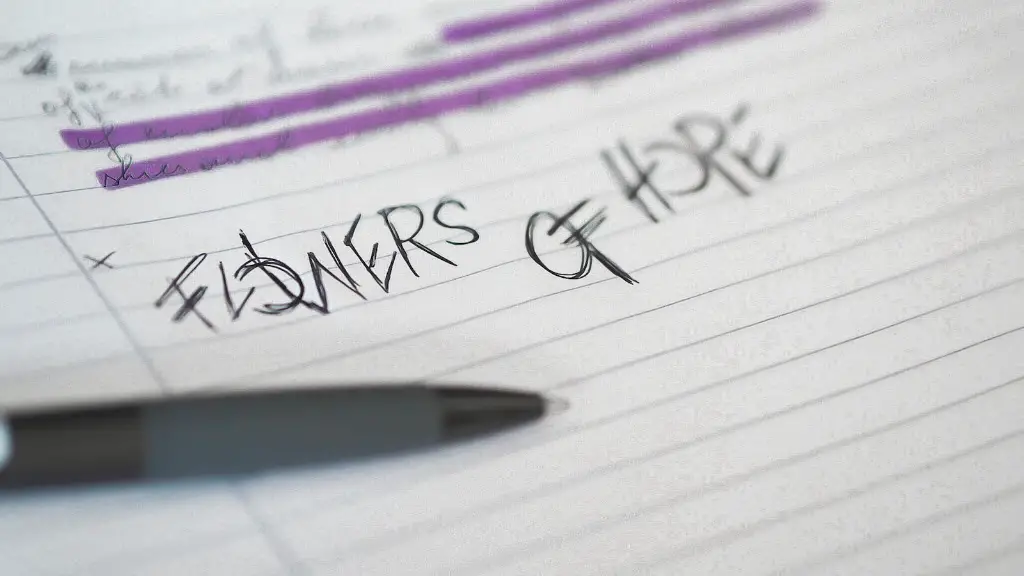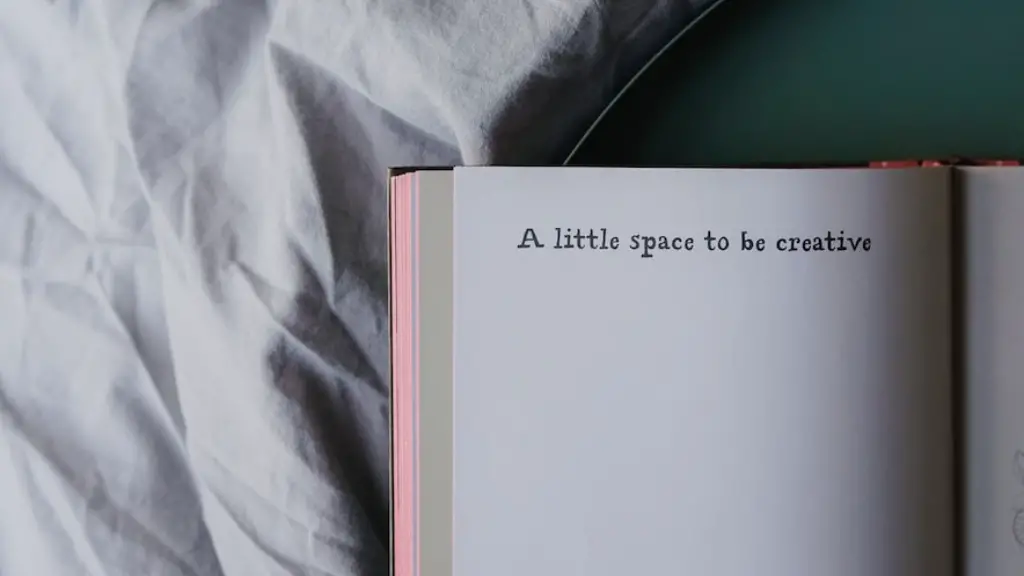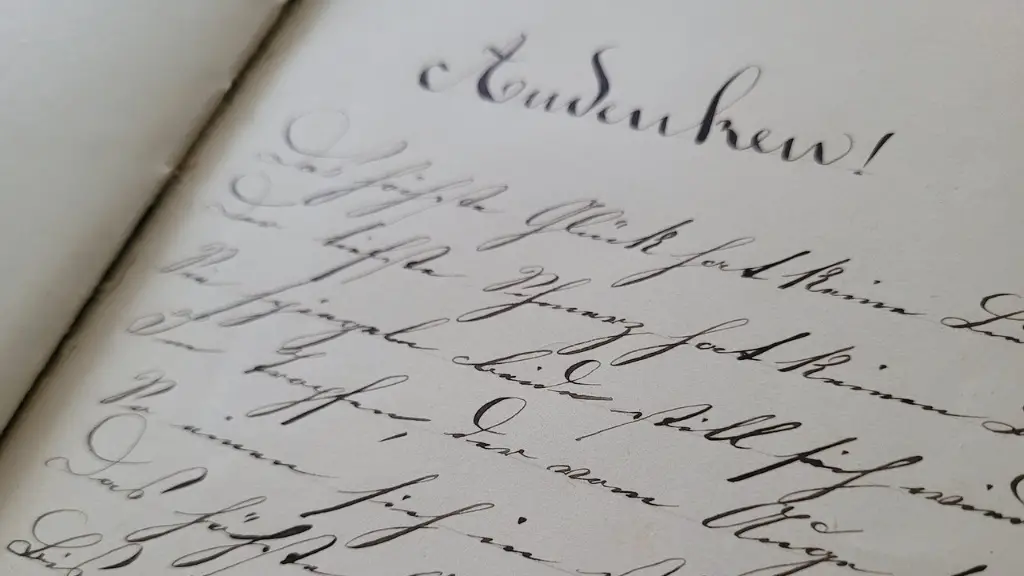Introduction to Poetry
Poetry has been an integral part of human culture since the earliest recorded times.Every culture around the world has some form of this form of literature,which gives us an insight into their beliefs and ways of life.From a practical standpoint,poetry can also serve as a means of self-expression and often used to convey feelings and emotions in creative ways.
For many people, poetry can be both therapeutic and educational. Through understanding how to interpret a poem,we can gain insight into the author’s point of view,their feelings and intentions.This can be helpful in better understanding why people might respond to the poem in different ways. Moreover, reading and writing poetry can improve one’s language skills, imagination, and communication skills.
The Role of Poetry in Society
In modern times,poetry is surprisingly still applicable in our lives. It can be used to increase one’s appreciation of words and language, or to simply enjoy some quiet time out of the hustle and bustle of everyday life.Some researchers suggest that poetry can also be harnessed to help people become more empathic, tolerant, and less judgmental.
In a society where the written word has lost its importance, poetry can be seen as a way of reclaiming and recognizing the power of writing. It serves as an essential reminder of the vitality of language and its use in expressing ideas, feelings, and emotions that may not be readily conveyed through other forms.
The Benefits of Poetry
Poetry is known to have numerous advantages and benefits.Aside from the obvious aesthetic pleasure that one can receive from reading a poem,it can also help one cultivate a spirit of appreciation for life and promote a sense of joy and fulfillment. This is because poetry, when written thoughtfully, deals with themes of beauty and life in a way that can be deeply moving.
Moreover, poetry can also be a platform for self-expression. Unlike other literary forms, it does not require the writer to stick to a particular set of rules or structure. The poet has the freedom to express their unique thoughts and feelings in a free-flowing manner and in their own words, allowing them to externalize and internalize their emotions.
Some research also suggests that reading and writing poetry can boost creativity and increase one’s analytical skills by allowing them to make connections between seemingly unrelated ideas and comprehend complex situations in simpler ways.
How Poetry Benefits Mental Health
For those experiencing emotional distress, reading poetry can be a very effective way of dealing with stress, anxiety, and depression.Studies have shown that reading and writing poetry can reduce the severity of mental health symptoms, improve coping skills, and even reduce the risk of developing depression. Poetry can provide distraction from troubled thoughts and give one the emotional space to explore how they feel without having to face the pressure of judgement from others.
Engaging in activities like writing poetry or reading out loud can also help to develop and maintain self-confidence, resilience, and self-understanding. This can be very beneficial in creating an environment in which people feel safe and comfortable opening up about their emotions.
Furthermore, some psychologists suggest that focusing on poetry can uplift the mood and reduce feelings of loneliness and isolation, making it an excellent coping mechanism for times of hardship.
The Power of Poetry
In this day and age, the power of poetry should not be overlooked. It has the potential to transform our lives and our perspectives in a myriad of ways, from improving our comprehension of emotions to giving us a better appreciation for language and literature.
Above all, poetry is a powerful tool for self-empowerment.It provides a safe platform for people to explore their deepest thoughts and feelings, to interpret their emotions in their own unique ways and to externalize them in ways that are meaningful to them.
Furthermore,writing and reading poetry can be a useful technique for exploring ideas, fostering creativity, and striving towards self-actualization. People don’t always need a reason to enjoy poetry: it can simply be done for pleasure or as an expression of love and admiration.
What Kind of Poetry Should People Read?
When it comes to reading poetry, there is no one correct answer. It will depend on the individual’s personal preferences and interests. Some may find inspiration in classical poems and wordsmiths, whereas others may find solace in the works of contemporary poets. Ultimately, the best type of poetry to read will be the one that resonates most with one’s own values, beliefs, and experiences.
Some may also find it helpful to keep a journal and substitute words for feelings, or to participate in creative writing workshops and take courses related to poetry.Remember, there is no right or wrong way to enjoy poetry. The most important thing is to find a way to make peace with the words and explore the depths of one’s own emotions.
How to Connect With Poetry
Although some may initially struggle to make a connection with poetry, there are plenty of ways to deepen the connection with this art form.Practicing mindfulness and developing an interest in writing or reading poetry can help one to delve deeper into the works of certain authors and gain a greater understanding of the themes, metaphors, and messages within the poems.
The key is to identify and explore one’s own thoughts and feelings by using poetry as a platform for self-expression.No matter what type of poetry one enjoys, it is important to remember that poetry can be a powerful tool for self-discovery, growth, and healing.
The Role of Poetry in Education
The role of poetry in education has long been celebrated. Many academics believe that poetry is one of the best ways to introduce younger generations to the beauty of literature and language. Poetry can also be used to stimulate the imagination and creativity of students, as well as teach them about the various ways in which language can be used to convey messages and ideas.
Moreover, teaching poetry can also be a great way to introduce students to a variety of concepts,including symbolism, alliteration, rhythm, and metaphor.
Incorporating poetry into the classroom can also be beneficial for building social skills in children. Reading and writing poetry can enable students to share ideas in a productive and non-confrontational environment and learn important skills such as teamwork and communication.
Conclusion
In conclusion, it is clear that poetry is more than just an art form: it is an invaluable supplement to our lives and an excellent way of exploring our feelings and emotions. Poetry can help to reduce stress, anxiety, and depression and can be used as a tool for self-expression and self-discovery. It can also help to improve creativity and language skills, as well as provide an opportunity for children to learn about the beauty and power of words.





